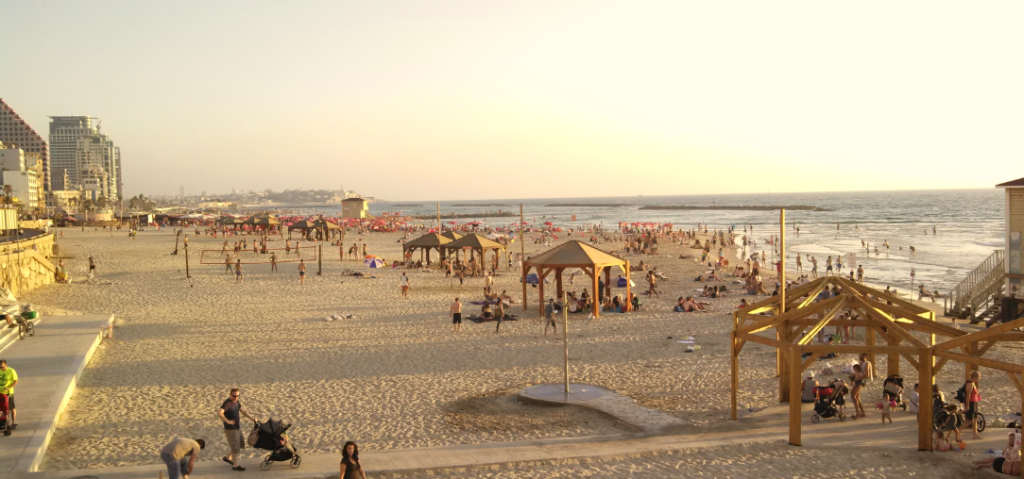And then there were none (of the pre-Oslo Arab killers of Israelis left in prison)
Another in my ongoing posts from Israel:
Today was a rest day, with the only real activity some time at the beach in front of our hotel in Tel Aviv.
The Mediterranean Sea was warm, and the waves and undertow strong. It was great to ride the waves, but one man drowned just after we left the water.
In the evening I did my part to break the boycott of Aroma Café, of which we have written before. (Remember, Buycott Israeli companies to defeat BDS.)
But the big news of the day was that Prime Minister Benjamin Netanyahu released an Open Letter (read the whole thing) to the Israeli public signaling his intention to seek Cabinet Approval on Sunday to release all Palestinian and Israeli Arab prisoners convicted of security offenses prior to the 1993 Oslo Accords, thereby complying with a promise John Kerry had made to Mahmoud Abbas as a precondition to peace negotiations.
The Times of Israel reports:
Amid reports that Israel has reluctantly agreed to release all 100-plus Palestinian and Israeli Arab prisoners held since before the Oslo Accords were signed in 1993, Prime Minister Benjamin Netanyahu on Saturday night issued an open letter to the public, bracing Israelis for an extremely “difficult decision” that he was taking in defiance of public opinion but “for the good of the country.”Netanyahu reportedly agreed to release all 104 pre-Oslo prisoners, including 20 or more Israeli Arab citizens, because the Palestinians made clear to US Secretary of State John Kerry that otherwise they would not come to the scheduled resumption of peace talks in Washington on Tuesday.
Despite opposition, the proposal is expected to pass, according to The Times of Israel:
“You kill terrorists, you don’t free them,” Economy and Trade Minister Naftali Bennett said.“Experience has taught us that every prisoner release encourages terror, and has never brought peace. It tell the next generation of terrorists that someone will work to release them. All the democracies in the world have learned this lesson. They don’t release terrorists even in exchange for captured citizens. They won’t even negotiate,” said Deputy Foreign Minister Ze’ev Elkin, reflecting the views of many other Likud MKs, including Deputy Defense Minister Danny Danon and coalition chairman Yariv Levin.But none of that opposition has the power to reverse Netanyahu’s decision: A Times of Israel tally of the cabinet arithmetic shows the prime minister’s majority is all but assured.
This release comes on top of over 1000 prisoners, many who committed mass terrorist attacks, who were released in exchange for Israeli solder Gilad Shalit two years ago.
Here is the list of prisoners who likely will be released, via CAMERA:
The Israeli public, once again, will have to witness the humiliation of terrorists and murderers being greeted as heroes in Palestinian towns and villages.
It’s hard to understand the capitulation on prisoner releases, but I did gain some insight during a discussion I had last week with a government official in a position to know the details and flow of the negotiations. While discussing the peace negotiations, the official mentioned that he had children serving or about to serve in the army, and that when the time came that they might be called upon to fight, he wanted to know that the government had done everything it could to find peace.
The comment struck me at the time, particularly when he showed me a photo. A high percentage of Jewish families in Israel have a family member in the active military or reserves. While there is no uniformity of approach and certainly people differ on prisoner releases (with the vast majority against), I do think it’s sometimes hard for Americans to understand how broadly the military situation affects Israeli society.
By releasing prisoners in stages, Israel will be able to say that it did everything it could to see if there really was a peace partner on the other side.
That test, which few expect to succeed, is important in several additional respects. It buys Israel time from multiple sources of pressure, including the Obama administration which perversely still views the Israeli-Palestinian dispute as the source of all problems in the Middle East and implicitly blames Israel; from the Palestinians U.N. lawfare; and from EU boycott pressure.
Buying time on multiple diplomatic fronts is important because Israel has its eye on the ultimate existential threat, the Iranian nuke program.
There’s something else in Netanyahu’s letter which jumped out at me, a point I was going to save for my post-trip writing, but I’ll address now. Here’s the paragraph:
The best answer we can give to those same base murderers that sought to defeat us through terrorism is that in the decades that they sat in prison, we built a glorious country and turned it into one of the most prosperous, advanced and strongest countries in the world.
The Israel of 2013 is not the Israel of 1980 when I worked on a kibbutz in the Galilee, or the Israel of 1983, when my wife and I toured the country.
Israel has grown tremendously in terms of economy, population, technology, military, and self-confidence.
Israel built while the Arab haters of Jews hated; their hatred now is consuming their own societies as Israel continues to build.
The full series of posts from my trip to Israel:
- Metula and the fake Hezbollah village
- On the Golan Heights – The Valley of Tears
- On the Golan Heights – The Battle of Tel Saki
- On the road to Golan
- And then there were none (of the pre-Oslo Arab killers of Israelis left in prison)
- To Samaria and back
- A stone’s throw away from trouble in Jerusalem
- What explains Americans’ strong support for Israel?
- Trying to explain the Tea Party in Israel
- This Night In Jerusalem
- Good morning, Tel Aviv
CLICK HERE FOR FULL VERSION OF THIS STORY

